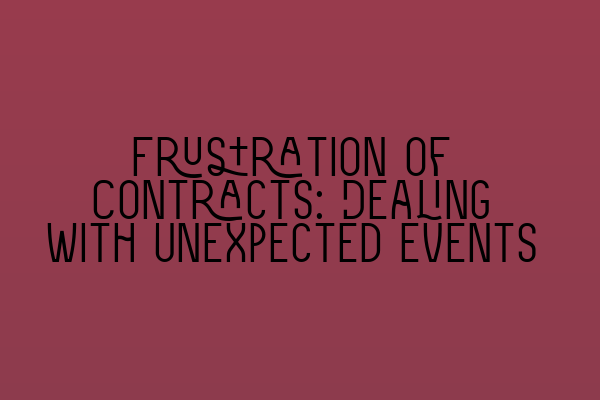Frustration of Contracts: Dealing with Unexpected Events
In the world of contract law, unexpected events can often disrupt the smooth execution of agreements. These events, referred to as “frustration of contracts,” can have significant implications for both parties involved. This blog post will explore the concept of frustration of contracts, its legal implications and how to navigate these unexpected situations.
Understanding Frustration of Contracts
Contract frustration occurs when unforeseen circumstances arise that fundamentally alter the nature of the contract, making it impossible to perform as originally intended. Such events may include natural disasters, government regulations, or even the outbreak of a pandemic.
When a contract is frustrated, both parties may find themselves unable to fulfill their obligations. This raises questions about the rights and liabilities of each party and whether the contract can be terminated or modified.
Legal Implications
In many jurisdictions, frustration of contracts is recognized as a legal principle that allows parties to be relieved from their contractual obligations in exceptional circumstances. However, the criteria for successfully invoking frustration can vary, so it is crucial to seek legal advice to determine the specific requirements in your jurisdiction.
It is important to note that frustration does not render a contract void from its inception. Instead, it operates prospectively, releasing the parties from their future obligations. The rights and liabilities of the parties arising before frustration occurred remain intact.
Navigating Frustration of Contracts
When faced with a frustrating event, the first step is to review the contract carefully and identify any provisions that address unexpected events. Force majeure clauses or specific termination provisions may offer guidance on how to handle frustration.
If the contract does not provide for such situations, it is essential to communicate with the other party and attempt to negotiate a mutually agreed-upon resolution. This may involve modifying the contract, extending the timeline, or even terminating the agreement altogether.
Should negotiations fail, seeking legal advice is recommended. A solicitor experienced in contract law can guide you through the specific legal processes and potential remedies available to you based on the jurisdiction and the circumstances of your case.
Conclusion
In summary, frustration of contracts is a legal concept that addresses unexpected events that render the performance of a contract impossible. Understanding the legal implications and navigating these situations requires careful analysis of the contract, open communication with the other party, and seeking legal guidance when necessary.
To learn more about SQE Contract Law and related topics, explore our SQE 1 Practice Exam Questions, SQE 1 Practice Mocks FLK1 FLK2, SQE 2 Preparation Courses, SQE 1 Preparation Courses, and SRA SQE Exam Dates.
